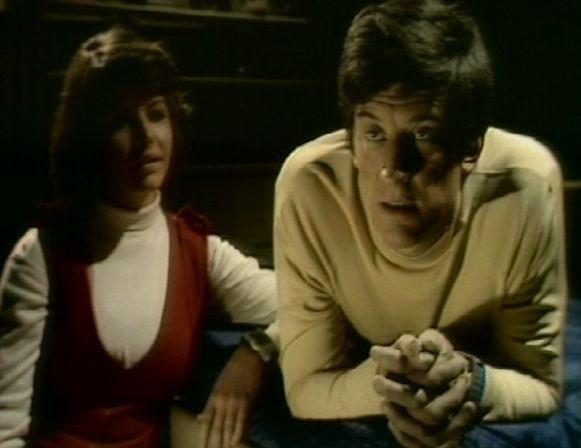
An accident in a chemical factory … Nurses Sandra Ling, Jo Longhurst and Shirley Brent all have a part to play in what follows (Radio Times Listing).
A fair chunk of Accident, the first fifteen minutes especially, takes place outside of the environs of St Angela’s. To begin with we’re back on the beat with Sandra (who’s continuing her occupational therapy placement). Last time I commented about how everybody seemed just a little too nice to her, but today things are a tad more realistic – on the way into work she’s confronted by the leering Geoff Fenton (Graham Fenton) who declares that he needs a touch of massage. Sandra’s fiery expression leaves us in no doubt about what she thinks of him ….
Fenton’s the rather lackadaisical safety manager at a local chemical factory which will prove to be central to today’s story. Indeed, the fact that we’ve already been told that things are a bit slack there might explain why Bob Hubbard (Barry Lowe) was left to tend the machines all by himself.
So whilst Bob is getting squirted with a dangerous chemical called phenol, his number two – Charlie Masters (Andy Bradford) – and seemingly eveybody else are getting the once over from Sandra. It does slightly beggar belief that Bob’s left to suffer all by himself. Surely it would have been a good idea for someone else to be in the factory with him?
Despite the episode title, this was no accident – it was deliberate sabotage. The sight of a twitchy David Troughton (playing John Overton) tinkering with the machines earlier on had already set us up to expect something bad to happen, but another plot niggle is the later reveal that Overton was deliberately targeting Bob. How could he have known that Bob would be tending that particular machine at the precise moment it blew?
Jo is currently working in the intensive care unit which puts her in a more subservient role than usual. On the wards she and the other nurses tend to pretty much rule the roost, but here she’s very much down the pecking order. First comes Dr Miles (Terence Conoley), then Sister Ashton (Marcia King) and then finally Jo. Dr Miles tends to give Sister Ashton the rough edge of his tongue and Sister Ashton is equally snippy with Jo. Poor Jo, on the lowest rung of the ladder, has no one beneath her she can be horrid to ….
The relationship between Jo and Sister Ashton (presumably playing the same character as the unnamed intensive care Sister from Vocation) isn’t explored in any great depth. We know that Jo loathes her (she calls her a “bitch” out of earsbot) although Vocation did suggest that Sister Ashton’s dispassionate nature was simply a coping device. When dealing with a never-ending stream of seriously ill patients, this seems reasonable.
The anxious Mrs Hubbard (Patricia Lawrence), waiting for news of her husband, is a type familiar to regular Angels watchers, although Lawrence still manages to tease some interesting nuances from what could otherwise be a fairly stock character.
The fact that Bob was having an affair with John Overton’s mother (played by Barbara Young) is something of a twist. It helps to explain why Overton, already presented as a disturbed type even before we learn that he’s attending the psychiatric clinic, decided to attack Bob. Young’s performance is somewhat broad – indeed, during the scene where Mrs Overton confronts her son it teeters over the edge somewhat.
Another slightly odd turn comes from Andy Bradford as Charlie. He seems so hyperactive and annoying that you’d assume he would be the last person (apart from the homicidal Overton) who should be let loose on dangerous machinery. Although to be fair, he’s much more subdued after Bob’s had his accident.
Troughton is much more restrained than either Young or Bradford. Overton is easily able to function normally on a surface level (Sandra doesn’t pick up that anything is wrong when she gives him a routine check-up) and he only starts to devolve later on when the (unseen) police begin to close in on him. Overton’s child-like nature (reinforced by the fact that comics are his favourite reading matter) is played well by Troughton, who’s as good as you’d expect.
Shirley has decided that she’s interested in combining geriatrics and psychiatry, which helps to explain why she’s currently working with Dr Berry in the psychiatric unit. This feels slightly contrived, but it does allow the impressively bearded Dr Berry (Roy Holder) to question Shirley’s reasons for being there. It’s previously been suggested that working in geriatrics was something of a retreat for her and psychiatrics might be even more so (especially if she’s using it to work out her own unresolved issues).
This is an intriguing possibility, although given that the story is quite busy there’s not a great deal of time to develop it. Indeed, this is one reason why Accident doesn’t quite gel for me – there’s plenty of story potential in the various issues raised, but the script would probably have benefited from having a narrower focus. It’s still perfectly watchable, but does feel somewhat bitty.








